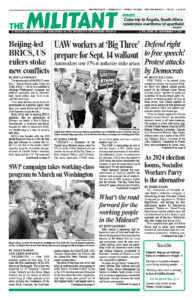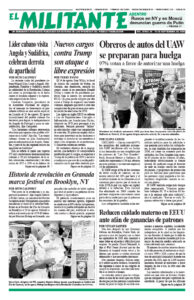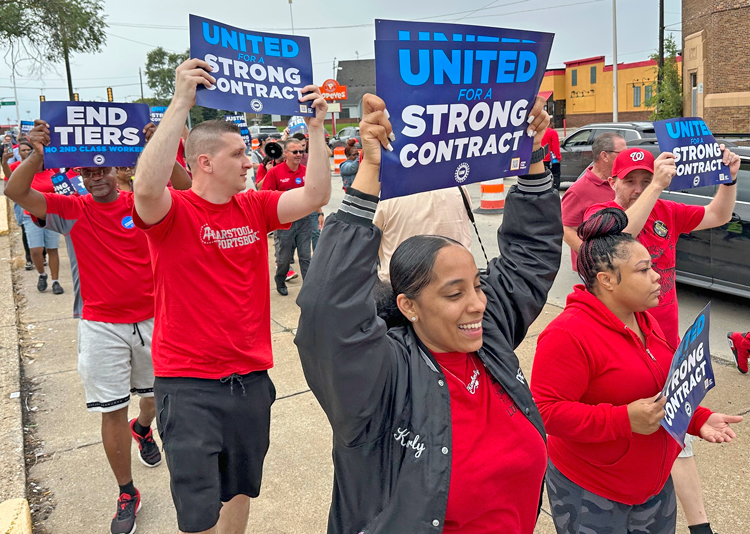CHICAGO — Members of the United Auto Workers union voted by 97% to strike if their demands are not met by the bosses of the Big Three — Ford, General Motors and Stellantis. The union represents 150,000 workers at these plants and their contract expires Sept. 14.
The UAW is demanding an end to two-tier wages, a 40% hourly wage increase and restoration of cost-of-living-allowance clauses to compensate for inflation. COLA was eliminated in 2009 when the bosses demanded concessions as part of being bailed out of bankruptcy by the government.
Other demands include the reestablishment of medical benefits for retirees and a pension for all workers, that was cut in 2009, as well as higher pay for retirees. The Big Three have closed 65 plants over the last 20 years, slashing the number of workers. The union demands the right to strike over plant closures, as well as protection programs to guarantee bosses continue to pay workers laid off when a plant shutdown does occur.
The UAW also demands more paid time off for workers to be with their families. “Our members are working 60, 70, even 80 hours a week just to make ends meet,” a union flyer says. “That’s not living. It’s barely surviving, and it needs to stop.”
The union has begun organizing “practice pickets” to show UAW members’ determination to fight. The tactic follows ones initiated by the Teamsters at UPS, who held pickets and rallies across the country before winning a contract adopted overwhelmingly by its members.
Hundreds joined union actions in Louisville, Kentucky, and Detroit Aug. 23-25. Workers chanted, “Equal work for equal pay. All the tiers must go away!” and, “Record profits. Record contracts!”
Andrea Harris, 42, a repair tech at the Stellantis Mack Assembly Plant, told the Detroit Free Press she was picketing “for better wages for my family.” She described a grueling pace on the assembly line that left her legs injured, requiring hospitalization at one point. “We’re ready to strike. We’re tired,” she said.
Socialist Workers Party campaigners went to the Ford assembly plant here in Chicago to find out what workers thought about these issues. “They treat us like garbage,” said Darnel Dixon, who just started there two months ago. “Like today, we got sent home early,” cutting their pay. He said they aren’t guaranteed eight hours of work when they clock in. And he said the starting wage is $16.67 an hour, barely more than Chicago’s minimum wage.
Another worker who’s been there two years said he makes a bit over $19. A worker with 13 years said he’s up to $32. “So the demand to end the two-tier wages is major,” said Naomi Craine, a rail worker and Socialist Workers Party candidate for U.S. Congress in Illinois’ District 4.
“A divided union is not going to survive. We can’t have all these classes of workers within the same damn workplace doing the same damn work,” UAW President Shawn Fain said when he addressed pickets at Ford’s Truck Plant in Louisville.
Terrence Parham, who has worked at Ford for about 10 years, told the press his job at the plant involves tough working conditions that can lead to repetitive-motion injuries. He said that wear and tear means the demand for a pension for all autoworkers is crucial.
Unionists look to make gains
“This is our time to take back what we are owed. Working together with the companies doesn’t work for us. The only way the working class advances is if we stand together,” Fain told union members in a live-stream update Aug. 25. “The only way we’re ever going to have a better quality of life for ourselves and our families is if we fight for it.”
Fain was elected this year in the UAW’s first-ever direct-ballot election, beating the incumbent, Ray Curry, by a few hundred votes out of some 140,000 cast. Curry took office in 2021 after the federal government intervened in the union, launching a “corruption” probe leading to the conviction of a dozen union leaders for embezzlement and other charges.
Fain’s election is one reflection of workers looking for ways to strengthen their unions and make gains. Workers face continuing attacks as the bosses seek to defend their profits against sharpening competition, by taking it out on the backs of the working class.
Other examples are the gains won by 340,000 Teamsters at UPS, the ongoing strike by 180,000 members of the Screen Actors Guild and Writers Guild, thousands of striking hotel workers in Los Angeles, workers on strike at International Flavors and Fragrances in Memphis, Tennessee, and other union struggles.
The Big Three bosses say they can’t meet the union’s demands because they face too much competition as the industry shifts to electric vehicles. These can be built with fewer workers than internal-combustion engine ones. They are spending billions on developing technology and building plants to manufacture lithium batteries for EVs.
Bosses shuttered the big auto plant in Lordstown, Ohio, in 2019. They built a new plant nearby called Ultium, a joint venture of GM and Korea’s LG. Industrywide there are now six U.S. plants making EV batteries and 22 more under construction.
The bosses insist these plants don’t come under the UAW master contract and that the union has to fight to unionize them one at a time. The 1,100 workers at the new Warren, Ohio, Ultium plant, built next to Lordstown, voted in the UAW in December 2022. Their starting wage was $16.50 an hour. The union has won a wage increase to $20 and back pay since the union election was won. Further negotiations continue.
The first union contract, which has been tentatively accepted by the union negotiating committee, raises starting pay to $20, then $21 after six months or 1,000 hours worked. This is far less than UAW workers get in the auto plants. Ultium is the first unionized lithium battery plant in the country.
The stakes for the working class as a whole in the Big Three fight is high! Solidarity with the UAW!
Naomi Craine contributed to this article.


